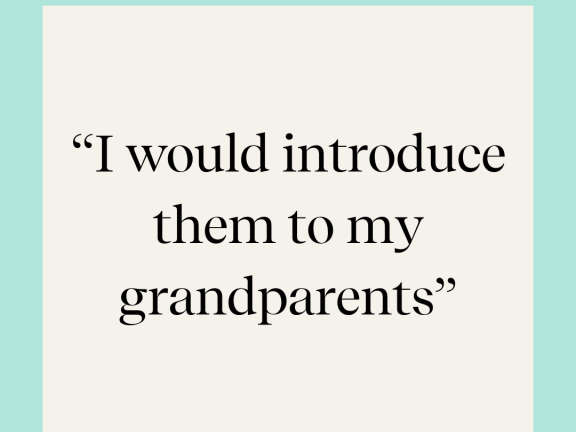In Conversation - Children of Immigrants

“I would introduce them to my grandparents.”
This, a comment from Cyrus, a high school student at Friends Central School. He was responding to my question about how he might try to engage people who agree with the anti-immigrant sentiment he feels is getting louder by the day.
Kiese’s answer was a little different: “I would take them for a walk around my neighborhood.”
Kiese, a resident of West Philadelphia and student at Masterman, says you can’t help but see the positive contributions of immigrants when walking in his neighborhood.
Ava, a student at the William Penn Charter School, is the last to chime in. “I’m not sure what I’d say...I’m not sure anyone would listen.” Cyrus and Kiese shake their heads in agreement. We all settle into a silence that lasts a little too long.
For this conversation, I’m sitting with three high school students. They say that immigration isn’t a regular topic of conversation amongst their peers at school, but they’re paying attention to the news. It’s personal to them. Ava, Kiese, and Cyrus are all the children of immigrants. Ava’s mom and Kiese’s dad are actually former NSC clients. Cyrus learned about NSC in a different way, and he joined us as an intern during the summer of 2024.
While many teens are regularly unimpressed by the adults in their lives, that’s clearly untrue for these three. Ava share with awe that her grandparents left Vietnam with five children on a boat they built themselves in their own backyard. The journey involved multiple refugee camps – and an encounter with pirates! – before they made their way to America. Her grandmother was a tailor, her grandfather a fabric printer.
As Ava speaks, you can tell she doesn’t understand why anyone would want to exclude people like her family. Her mother says NSC was like an oasis for them. Decades after being resettled, she still volunteers in our food pantry every Tuesday. Ava, not sure what to do in this dark moment, held a Bubble Tea fundraiser at Penn Charter last spring. Her mom delivered the $400 check.
Kiese shares similar confusion about rising anti-immigrant sentiments. His father was born in the Congo. His grandfather, a military leader, fled with his family from Angola. There, he was jailed, leading to the family’s journey to America as refugees. Kiese chuckles a bit when pressed about the narrative that immigrants are a drain on the economy. His father arrived with almost nothing. A decade later, he matriculated to Harvard. Formerly the City Solicitor, he’s now a partner at a major law firm.
Kiese’s father, too, has given back to the organization that helped him transition to America. A few years back, he even served as the Co-Chair for Global Tastes, NSC’s signature annual event.
Cyrus’ family has a bit of a different story. His mother was born in Baltimore during her parents’ medical training. Then, as planned, they returned to Iran. Nine years later, they fled to America. Their arrival was through a legal process, but they did not have permission to leave Iran – creating a permanent tension in their relationship with their former home. Now a doctor, Cyrus’ mom also creates art inspired by her homeland.
Cyrus is fiery. You can almost see him at the protests popping up in communities across our country. While clear in his opinion that our country should be welcoming to immigrants, Cyrus occasionally pauses to reflect. “You know, it just feels so polarized. I’m not even sure I know how to speak to people on the other side.”
He’s frustrated, but not hopeless. That’s what’s evident in conversation with these three. They’re angry – and sometimes scared – but they’re trying to find a way to contribute. They know that this country welcomed their parents, making possible the lives they are currently living. They still believe it can be that country again.
As young people have for generations, they’re just trying to figure out the role they want to play. I trust they’ll find it.
As our conversation comes to an end, things have turned a bit dark. The mood is somber. So, I ask, “what gives you hope?”
Cyrus, with a laugh, offers Bernie Sanders, the type of principled politician he’d like to see step forward in this moment (though he acknowledges we might need a next-generation version).
Ava’s answer is beautiful, though perhaps unsurprising. “My mom and grandparents. They went through so much, but they made it through.”
While the others were answering questions, Kiese pulls out his phone. An hour into the conversation, this is the first phone I’ve seen – a true testament to how engaged these young people are in the conversation. Kiese shares with us a picture of his baby cousin. Her parents came from Angola.
“I’m really excited to see her develop as a person,” he says. These young people understand what a gift it is that she’ll get to do it here.
The other teens lean in to look at the photo, knowing she’s a gift to America, too